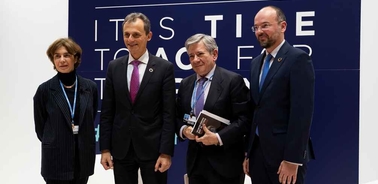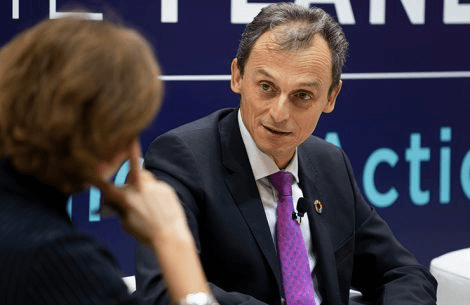- Home
- News And Events
- News
- Universities Are An Essential Pillar For The Development Of The 2030 Agenda
Universities are an essential pillar for the Development of the 2030 Agenda

IE University has organized a series of conferences, round tables and events as parallel activities of the COP25.
IE University participated on Monday on the first day of the 2019 United Nations Climate Change Conference (COP25) by organizing a panel on “The Role of Universities in the Implementation of the 2030 Agenda.” It included the Minister of Science, Innovation & Universities of Spain, Pedro Duque, the Vice-Dean for Management and Development of IE School of Global and Public Affairs, Jaime de Aguinaga, and the Chancellor of the University for Peace and former President of the European Parliament, Enrique Barón. The panel was moderated by Cristina Manzano, Director of esglobal.
 Minister Pedro Duque takes part in a panel on the Role of Universities in the Implementation of the 2030 Agenda
Minister Pedro Duque takes part in a panel on the Role of Universities in the Implementation of the 2030 AgendaThis is the first COP25 event organized by IE University, a supporting partner of the conference in Madrid. IE University will also sponsor two additional panels during the Conference: Art and Sustainability (Dec. 7, Blue Zone) and Sustainable Businesses (Dec. 13, Green Zone), as well as the premiere of the first episode of the documentary “A Story of the Future” (Dec. 7, Green Zone), produced by the Center for the Governance of Change of IE with History Channel. In addition, IE University will be further supporting the COP25 through its Sustainable Mindset event, taking place on the Madrid center through December 11th.
The Minister Duque emphasized universities’ key responsibility as “one of the most powerful tools for generating knowledge, raising awareness about the climate crisis, and promoting change.” He also highlighted the role of research, development and innovation in all transition processes and, in particular, in reaching the U.N.’s Sustainable Development Goals.
He encouraged universities to embed sustainable development throughout their curriculum and mentioned cooperation between countries as one of the biggest challenges of this process. “It is neither the agenda of a single ministry nor of a government or a university,” he concluded.
“Universities are one of the most powerful tools for generating knowledge, raising awareness about the climate crisis, and promoting change.”
The Vice-Dean of IE School of Global and Public Affairs commented that universities can contribute to the 2030 Agenda in various ways, for example universities should “generate evidence-based knowledge through research, train technical experts and leaders, promote values such as respect to the environment and social impact, test innovative solutions, and facilitate dialogue and consensus.”
Mr Aguinaga highlighted the urgency and relevance of the 2030 Agenda, but also emphasized the catalyzing role of universities: “If you want to chop down a tree you need to work hard, but also be smart. Investing in universities is like sharpening the saw to ensure that our actions toward the 2030 Agenda are effective and efficient.”
Aguinaga also mentioned IE’s Master in International Development, a program that has been recently launched in partnership with the United Nations System Staff College (UNSSC). “Over 20 high-ranking UN staff members will be teaching in this program, which has been co-designed with the UN around the 2030 Agenda,” he said. He also referred to the alliance with the China Scholarship Council and the Eisenhower Fellowships, and encouraged other partners to explore opportunities to collaborate and identify talent.
Finally, Enrique Barón described the University for Peace, an institution dependent on the U.N., which teaches the values of peace, development and sustainability. He stressed the role of the European Union as a guarantor of these pillars and welcomed the new Commission and its objective of placing the fight against climate change at the heart of EU policies.
Mr. Barón agreed that science must be seen as decisive in finding solutions to the world´s most pressing challenges and openly defended the need for multilateralism as the only way to address global issues.